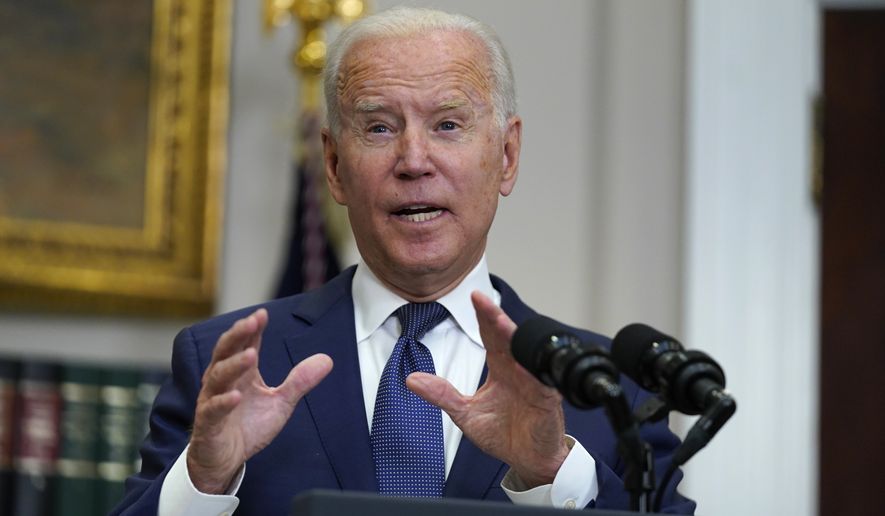
President Biden’s proposal for a new death tax to help pay for his $3.5 trillion social welfare expansion is hitting resistance from members of Congress, including a top farm state Democrat who warns that the tax will hurt family farms.
The proposal would change the way capital gains are calculated on inherited assets worth more than $1 million, taking a bigger bite out of inherited stocks, real estate, businesses and farms.
Of all the proposed tax increases to help pay for Mr. Biden’s bigger welfare state, this one would have the greatest impact and rake in an estimated $800 billion in revenue.
Mr. Biden has said he would give breaks to “certain” family-owned businesses, possibly farms, but that hasn’t sold the idea for House Agriculture Committee Chairman David Scott, Georgia Democrat.
“I am very concerned that proposals to pay for these investments could partially come on the backs of our food, fiber and fuel producers,” Mr. Scott wrote to Mr. Biden in June.
On the eve of the House’s first planned vote on the $3.5 trillion budget bill, the lawmaker’s worries had not been allayed, a spokesman said.
Proprietors of small businesses also are worried.
Far-left lawmakers such as Sens. Bernard Sanders of Vermont and Elizabeth Warren of Massachusetts have said a repeal of what is known as step-up basis would finally make millionaires and billionaires pay their fair share.
The calculation would apply the capital gains tax to the increased value of an asset during the deceased’s lifetime. Inheritance currently is subject to a capital gains tax on the asset’s value at the time of death, or its step-up basis.
Pat McDowell said the tax would spell the end of the McDowell Ranch, which he owns with his two brothers in central Texas.
The brothers want to pass the ranch to their niece to keep it in the family, as it has been for five generations. If the proposed tax is approved, she would have to sell off part of the ranch just to pay the death tax, he said.
Then there might not be enough ranch left to thrive.
“This plan punishes our family, just because we want the next generation to be able to make a living in agriculture,” Mr. McDowelll said.
The federal government already imposes a death tax on the total value of an inheritance, but only 50 of 31,000 farms whose owners died last year were subject to the tax, according to the Agriculture Department.
More farms, businesses and estates are expected to be taxed under Mr. Biden’s proposal.
The tax kicks in when the deceased has a net worth of $11.7 million or more, and it applies a 40% tax after the first $1 million in taxable assets.
The Biden death tax would apply a 40.8% capital gains tax to inherited assets with an exemption for the first $1 million and another $250,000 exemption for a personal residence. Married couples would get a $2 million exemption and the exemption for their residence, according to the proposal.
Details of the $3.5 trillion budget bill, including inheritance tax, are still being finalized. The House is preparing to vote Tuesday to advance the package, agree to its price and send it to committees to work out the details.
Democrats plan to pass the bill in party-line votes in the House and Senate. They will use a special budget procedure known as reconciliation, which allows the Senate to avoid the 60-vote hurdle that most legislation must clear. Instead, Senate Democrats plan to pass the legislation with a simple 51-vote majority, with Vice President Kamala Harris breaking the tie. That is the only way Democrats can get the liberal wish list of anti-poverty, education and health care programs through the evenly split Senate.
Liberals for years have been pushing for higher taxes on the wealthy to fund more benefits for working-class Americans.
The left-leaning Center on Budget and Policy Priorities argued that the current inheritance tax is unfair because it lets those who are rich enough to own valuable real estate, stocks or businesses escape taxes as their wealth grows.
The group pointed to Amazon founder Jeff Bezos, who paid income taxes on his $81,840 salary last year. At death, under current tax law, Mr. Bezos’ heirs would not have to pay taxes on the $100 billion that his Amazon stock generated from 2010 to 2018.
Their estimates were based on Securities and Exchange Commission filings.
In addition to taxing the full appreciation of inherited assets, Mr. Biden proposes increasing the rate of the capital gains tax to 40.8% from 23.8%.
The tax bill on an inherited $100 million estate could nearly double to $61.1 million, according to the conservative Tax Foundation.
Mr. Biden promised to soften the impact by delaying the tax for some family-owned businesses until the business is sold to someone outside the family. However, neither he nor congressional Democrats released details of such a plan.
“Families in agriculture and other small businesses feel this tax hike is about punishing them and know that Democrats are unlikely to provide any exemption,” said Rep. Kevin Brady of Texas, the top Republican on the tax-writing House Ways and Means Committee.





